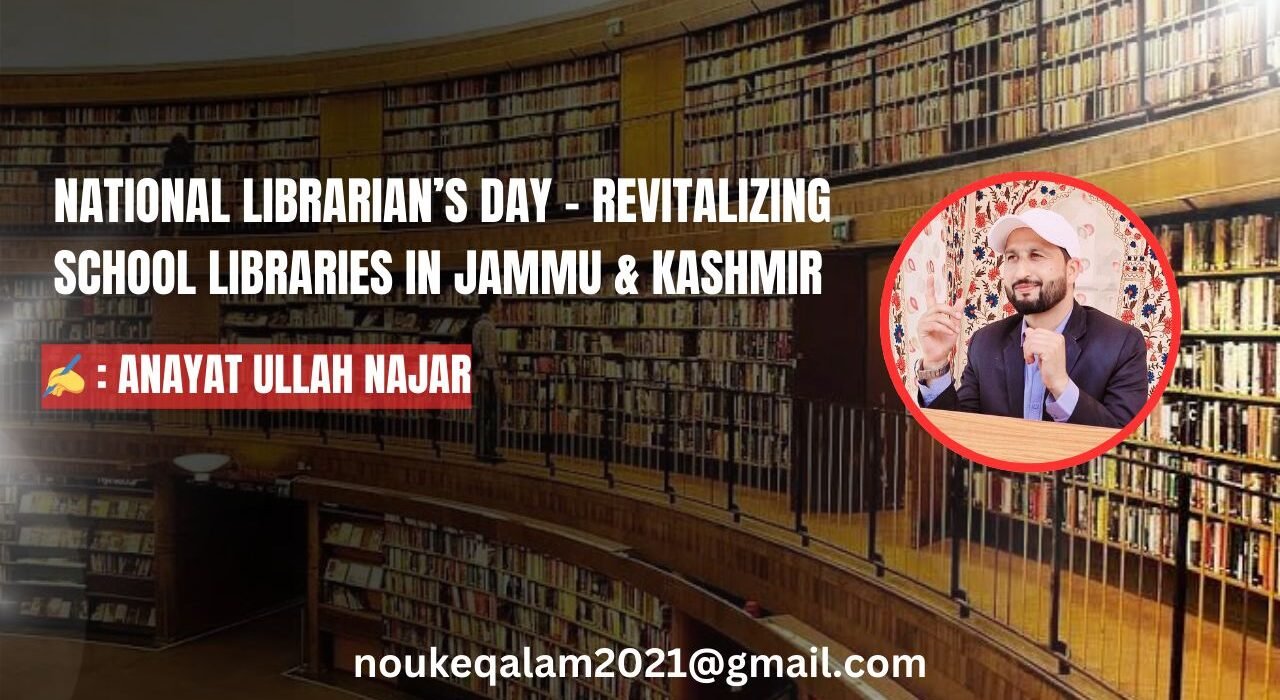✒️: Anayat Ullah Najar
National Librarian’s Day is celebrated in India every year on August 12th to honor the birth anniversary of Dr. Shiyali Ramamrita Ranganathan (1892–1972), widely regarded as the Father of Library Science in India. His remarkable vision, scholarly contributions, and pioneering efforts transformed the landscape of libraries in the country, giving them a structured, scientific, and user-oriented approach.
Originally trained as a mathematician, Dr. Ranganathan’s career took a transformative turn when he accepted the position of the first librarian at the University of Madras in 1924. This opportunity sparked his lifelong dedication to librarianship. His academic rigor, coupled with his deep commitment to public service, laid the foundation for modern library practices in India.
One of his most enduring contributions is the formulation of the Five Laws of Library Science, which continue to guide library professionals worldwide:
- Books are for use
- Every reader his/her book
- Every book its reader
- Save the time of the reader
- The library is a growing organism
These principles not only emphasize accessibility and inclusivity but also highlight the dynamic nature of libraries in adapting to the needs of readers.
Dr. Ranganathan authored several influential works, particularly in the field of library classification and cataloguing, and developed the Colon Classification system—a groundbreaking method that revolutionized how library materials were organized. He tirelessly advocated for the expansion of public libraries, believing them to be vital institutions for education, knowledge sharing, and nation-building.
A Librarian’s Perspective in Jammu & Kashmir
As a librarian, I am an eyewitness to the diminishing culture of library usage in Jammu & Kashmir. Sadly, many students today do not prefer reading beyond what is strictly necessary for exams. In the schools of the region, libraries require special focus and urgent upgradation—both in terms of resources and infrastructure.
In this 21st century, it is disheartening to note that basic internet facilities are still unavailable in most school libraries here. The concept of automated and digitally integrated libraries remains a distant dream.
It must be acknowledged that government policies of providing free textbooks and free books to school libraries are commendable and deserve appreciation. These efforts show the commitment to making learning resources accessible to every student, regardless of economic background. However, without proper infrastructure—purpose-built reading spaces such as well-lit halls, individual study carrels, group discussion tables, and comfortable seating zones—much of this valuable investment remains underutilized.
There is also a serious lack of reading-friendly environments in many schools. Most students have no dedicated, well-equipped area to sit, read, and explore beyond their syllabus. The inclusion of such thoughtfully designed spaces—separate quiet corners for focused reading, interactive zones for collaborative learning, and shelves arranged for easy browsing—can transform the library from a silent storeroom into a vibrant hub of knowledge.
To move forward, there is a pressing need for professional training programs to equip librarians with the skills required to operate and manage automated libraries. Moreover, the issue of career stagnation for librarians must be addressed, as the lack of promotional avenues dampens motivation and innovation.
A Call to Action
Today, National Librarian’s Day serves not only as a tribute to Dr. Ranganathan’s legacy but also as a reminder of the critical role librarians play in nurturing an informed and enlightened society. In an era where information is abundant yet often scattered, librarians stand as custodians of authentic knowledge, guiding readers toward truth, relevance, and intellectual growth.
For Jammu & Kashmir, this is a crucial moment to reimagine school libraries—from static repositories into dynamic learning environments that empower the next generation.
I earnestly request the Worthy Director of School Education and higher authorities to address these long-standing issues—by upgrading infrastructure, constructing modern library halls with designated reading zones, ensuring timetable provisions for library usage, and investing in automation and training—so that the libraries under the School Education Department become vibrant centres of learning and innovation.
A library is not merely a collection of books, but a living gateway to learning, empowerment, and progress—and it is our responsibility to keep this gateway open for every student.
Email: anayatbinnazir@gmail.com





Shabir Ahmad Rather
August 14, 2025I appreciate your good suggestion s and interest regarding development of libraries and to inculcate reading habits among student community. So far the school libraries and professional duties is concerned, unfortunately, no attention towards development of libraries and secondly the library staff appointed in this field were mostly 10th standard with certificate course. Thus resulting less attention and usually engaged in different assignments in the schools. In short I am in opinion that to inculcate the reading habits the professional staff having PG in LIS should come forward and show their mantle and dedication towards profession and arrange orientation programs like QUIZ, USER EDUCATION ,AWARENESS REGARDING READING HABITS LIBRARY SERVICE AND MICH MORE…
NQ Desk
August 14, 2025Assalamualaikum Wrtwb
Thanks for your valuable comment, I wish you shoud write an piece/Opinion on this topic, will love to publish it on Noukeqalamnews.com/en
Thanks and regards
Editor NQ News